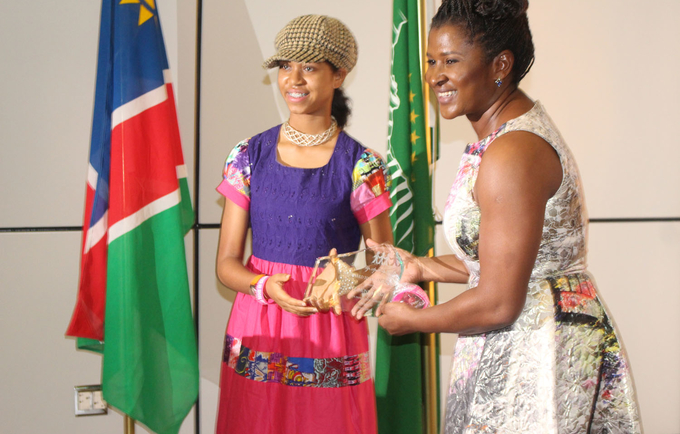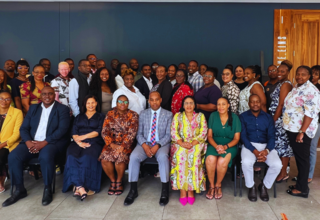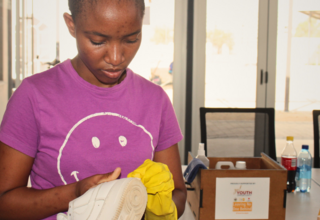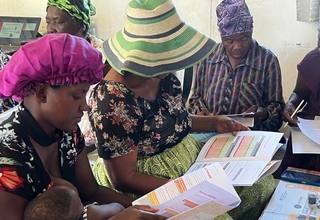First Lady of Namibia wins award
Namibia’s First Lady received the Dream Up, Speak up, Stand Up (DUSUSU) Award after hosting a panel discussion on Adolescent Sexual and Reproductive Health and Rights (ASRHR), led by Dennia Gayle, Representative for UNFPA Namibia, on 23 February.
The award was presented to First Lady, Monica Geingos, by inspirational girl child advocate Zuriel Oduwole. The DUSUSU project makes annual awards in recognition of strong, measurable or successful support of education in Africa.
Ms. Geingos is the third First Lady to receive the award, after the First Lady of Tanzania, Salma Kikwete, in 2014 and the First Lady of Kenya, Margaret Kenyatta, in 2015.
Tackle barriers to access
The panel discussion at State House was attended by more than 400 pupils from schools within the capital city, Windhoek. The emphasis of the discussion was on the need to improve adolescents’ participation in decision-making processes and planning for implementing sexual and reproductive health services for adolescents. In particular, the sociocultural barriers that prevent adolescent girls and young women from accessing sexual and reproductive health need to be removed.
“Nothing centred on the youth should be without the youth,” said Emma Theofelus, Deputy Speaker of the Children's Parliament of Namibia. “Discourse is important and young people need to always join the conversation, because they are the future.” She said it is vital that the conversation around ASRHR begins at home to avoid any misinformation or unwanted interpretation of the information by teens. “As young people, we need to assist our elders in becoming comfortable with talking about sex and sexuality with us as well as get advice from them, as they are the best in giving that advice,” she said.
Ms. Theofelus spoke about how, as a young person, the challenges can be intensified by public perception of young girls accessing sexual and reproductive health. “When society shuns the idea of young girls and boys getting information on the issue then we cannot expect to minimize teenage pregnancy,” she said. “Teenaged boys need to be sensitized and taught the responsibility of parenthood when they make a girl pregnant. This will not happen if our society continues to put labels on young girls and hold them solely responsible for becoming pregnant,” she added.
Give access to accurate information
Bravo Linosi, Executive Director of the Namibia Planned Parenthood Association (NAPPA), reiterated the need for young people to have access to accurate information. “They need access to information and services that will empower them to protect themselves from sexually transmitted infections (STIs) and HIV, empower them to decide when to engage in sexual activities, when to get married, who to marry and when to have a child,” he said.
He cautioned that not only is it important for young people to know their reproductive rights, but it is equally important for them to apply a sense of responsibility when exercising their rights. “Making the correct choices towards reproduction is very important. When you make a child, are you able to carry that child, are you able to support that child financially, and are you able to care for that child?” he warned.
In Namibia, 19 per cent of women aged 15-19 years have begun childbearing, though some regions report a rate of more than 30 per cent, according to the latest Demographic and Health Survey (DHS). Teenagers in rural areas (20 per cent) and with only a primary level education (26 per cent) tend to start childbearing earlier than their urban (16 per cent) and better educated peers (17 per cent).
Teenage pregnancies also have a direct bearing on maternal mortality, accounting for eight per cent. To this end, UNFPA last year commissioned a National Teenage Pregnancy Study to better understand teenage pregnancy in the country. Once finalized, the study will provide recommendations on what are the key interventions needed to curb teenage pregnancy in the country.
By Emma Mbekele




